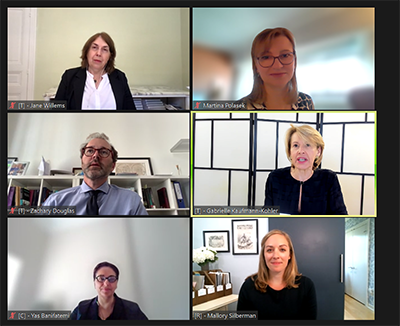How ICSID is reducing its environmental footprint in the spaces where we work and the cases we administer
ICSID has taken great strides to manage the environmental impacts of its business. This entails reducing waste and energy emissions at our headquarters in Washington, D.C., and the cases we administer around the world.

Investments in information technology have led to some of the greatest impacts on efficiency and sustainability in ICSID cases.
ICSID’s online case management system, for example, allows documents and correspondence to be exchanged seamlessly and securely amongst parties, tribunals, and the ICSID Secretariat. Under ICSID’s recently amended rules of procedure, electronic filing is the default in all ICSID cases. Long gone are the days when voluminous banker boxes of documents were routinely shared over the life of case.
The use of virtual and hybrid hearings has been similarly transformative. While virtual hearings swiftly became the norm during the COVID-19 pandemic, they had been steadily growing in popularity in the years prior. Today, even as health-related restrictions on travel have ceased in most places, the majority of ICSID hearings continue to be held using remote technology.
When ICSID cases take place in person, ICSID’s hearing facilities in Washington, D.C. and Paris, France, offer sustainable solutions.
For hearing facilities—and buildings in general—the bulk of emissions result from the generation of electricity. ICSID’s offices and facilities in D.C. greatly reduce emissions through comprehensive energy-savings technologies. For instance, occupancy sensors automatically turn lights on when a room is occupied and off when it is not, while state-of-the-art HVAC are highly energy efficient. As a result of these and other measures, ICSID’s offices are LEED Platinum—the highest rating in the Leadership in Energy and Environmental Design’s green building certification program. In fact, it was the first redeveloped office building on the East Coast of the United States to achieve LEED’s top ranking back in 2009.
As part of the World Bank Corporate Responsibility Program, ICSID has been offsetting GHG emissions from its offices and travel since 2006.

In addition, ICSID’s offices are part of the World Bank Group’s waste disposal system that optimizes recycling and composting rates—thus greatly reducing the amount of waste we send to landfill.
ICSID, together with its sister organizations in the World Bank Group, takes its social responsibility seriously—and, as such, will continue to ensure that environmental sustainability is embedded throughout our business practices.

